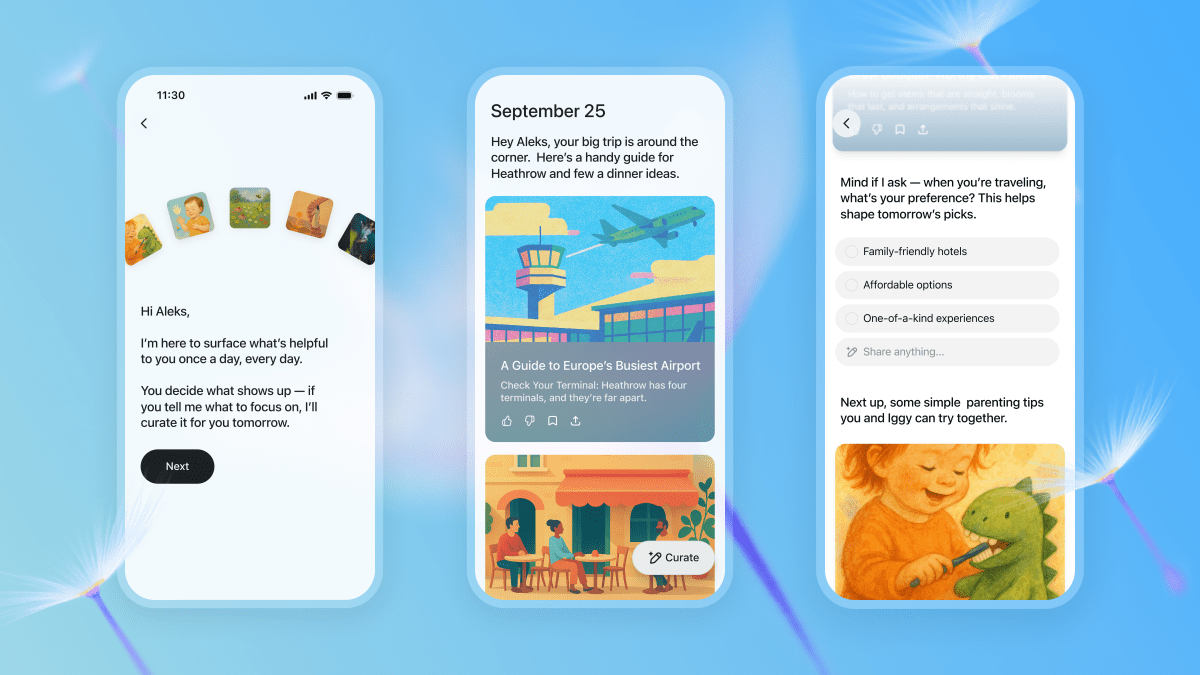OpenAI Introduces ChatGPT Pulse for Personalized Morning Briefs

Key Points
- OpenAI launches Pulse, a new ChatGPT feature for personalized morning briefs.
- Pulse delivers five to ten concise reports each morning, created while users sleep.
- Initially available to $200‑a‑month Pro plan subscribers; broader rollout planned.
- Reports include news roundups, itinerary suggestions, and tailored content displayed as AI‑generated cards.
- Integrates with Connectors like Google Calendar and Gmail to surface key emails and agenda items.
- Designed to stop after a few reports, showing “Great, that’s it for today” to avoid endless engagement.
- Personalization examples include running‑focused travel plans and pescatarian‑friendly dining options.
- Future goals aim for more agentic functions such as reservations and email drafting.
- OpenAI emphasizes Pulse will complement, not replace, existing news apps.
OpenAI has launched Pulse, a new ChatGPT feature that creates personalized reports while users sleep. Offering five to ten concise briefs each morning, Pulse aims to make ChatGPT the first app people check at the start of their day. Initially available to Pro plan subscribers, the service provides news roundups, customized itineraries, and other tailored content displayed as AI‑generated cards. Integrated with Connectors like Google Calendar and Gmail, Pulse can parse emails and calendar events overnight, surfacing key messages and agendas. OpenAI plans to expand Pulse to all users, with future ambitions for more agentic capabilities.
Introducing ChatGPT Pulse
OpenAI announced a new feature inside ChatGPT called Pulse. The service generates personalized reports for users while they sleep, delivering five to ten concise briefs each morning. Pulse is designed to encourage users to open ChatGPT as the first app they check at the start of the day, similar to how people browse social media or news apps.
Strategic Shift Toward Asynchronous Assistance
Pulse reflects a broader shift in OpenAI’s consumer products toward asynchronous assistance rather than reactive question‑answering. Other features such as ChatGPT Agent and Codex also aim to make the platform feel more like an assistant. Fidji Simo, OpenAI’s senior leader for applications, said the company is building AI that brings high‑level support to everyone, and Pulse is the first step in that direction.
Availability and Rollout
Initially, Pulse is rolling out to subscribers of the $200‑a‑month Pro plan, appearing as a new tab in the ChatGPT app. OpenAI’s CEO Sam Altman noted that compute‑intensive products like Pulse are currently limited to the most expensive subscription tier while the company expands its server capacity with partners such as Oracle and SoftBank. The goal is to eventually make Pulse available to all ChatGPT users, with Plus subscribers slated to receive access soon.
Types of Reports and Demonstrations
Pulse can produce a variety of reports, from news roundups about specific topics to highly personalized briefs based on a user’s context. Demonstrations included a roundup of news about the British soccer team Arsenal, group Halloween costume suggestions, and a toddler‑friendly travel itinerary for a trip to Sedona, Arizona. Each report is displayed as a “card” featuring AI‑generated images and text, and users can click the card to view the full report and ask follow‑up questions.
Design Choices and User Experience
After generating a handful of reports, Pulse stops and displays the message “Great, that’s it for today,” a deliberate design choice to differentiate the service from engagement‑driven social media platforms. The feature integrates with ChatGPT Connectors, allowing users to link apps like Google Calendar and Gmail. With these connections, Pulse can parse overnight emails, surface the most important messages, and generate agendas for upcoming events. If a user’s memory features are enabled, Pulse also pulls context from previous chats to improve report relevance.
Personalization in Action
OpenAI’s personalization lead, Christina Wadsworth Kaplan, demonstrated how Pulse automatically incorporated her love of running into a travel itinerary for London and identified pescatarian‑friendly menu options for dinner reservations. These examples highlight Pulse’s ability to tailor content to individual preferences without explicit user prompts.
Positioning Within the News Landscape
Pulse cites its sources with links, similar to ChatGPT Search, and OpenAI does not expect the feature to replace existing news apps. The service’s compute usage can vary widely depending on the task, ranging from efficient summaries to more intensive web searches and document synthesis.
Future Aspirations
OpenAI envisions making Pulse increasingly agentic, potentially handling tasks such as restaurant reservations or drafting emails for user approval. However, the company acknowledges that such capabilities are a long way off and will require further advances in its agentic models before users can trust the system with those decisions.